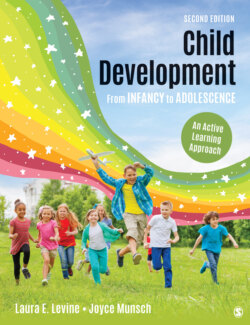Читать книгу Child Development From Infancy to Adolescence - Laura E. Levine - Страница 226
На сайте Литреса книга снята с продажи.
Maternal Diet
ОглавлениеOne of the best ways to ensure a healthy pregnancy is for a mother to have a healthy diet. Because the developing baby is so small relative to the size of the mother, an average of 300 extra calories a day is all that is needed to support prenatal growth (Kam, 2016), with fewer calories required early in the pregnancy and more nearer the time for delivery. The recommended weight gain for women who begin their pregnancy at a normal weight is 25 to 35 pounds (ACOG, 2013). Newborns typically weigh between 5 pounds 8 ounces and 8 pounds 13 ounces (KidsHealth, 2017). The remainder of the pregnancy weight is made up of amniotic fluid, the placenta, increased fat stores in the woman’s body, and increased maternal blood volume. Infants who are born smaller than average for their gestational age are more vulnerable to infections, and those who are much larger than average increase the length of labor and risk difficulties in the delivery itself.
T/F #4
A pregnant woman is “eating for two” so she should double the number of calories she consumes each day. False
When a pregnant woman has a severely restricted diet, it can affect the future health of the infant, as well as cognitive skills, problem-solving abilities, developmental levels, and behavioral functioning (Boulet, Schieve, & Boyle, 2011; Sudfeld et al., 2015). However, malnourishment is not the only developmental risk. Whether a pregnant woman’s diet is nutritionally restricted or is a more typical high-fat Western diet, it can predispose her infant to obesity later in life by affecting how the child’s metabolic system will function. In this way, maternal nutrition can contribute to what has been called a “legacy of obesity” (Parlee & MacDougald, 2014, p. 495).
Healthy eating while pregnant. Healthy eating is always important, but particularly while you are pregnant. The mother’s diet provides all the nutrients her developing child needs. Avoiding foods that can be harmful is equally essential.
Fuse/Thinkstock
Because pregnant women need an adequate amount of vitamins and minerals, doctors usually prescribe a multivitamin or prenatal vitamin. Folic acid, one of the B vitamins, plays an important role in preventing defects of the brain and spinal cord, so the CDC (2016k) recommends that all women of childbearing age consume 400 micrograms of folic acid daily, even if they are not pregnant. This can come from foods in the woman’s diet (such as fortified breakfast cereals, beans, leafy green vegetables, and orange juice) or from a food supplement.
There also are some foods that should be avoided because of risks associated with them. For instance, luncheon meats and soft cheeses such as Brie and feta can contain bacteria (U.S. Food and Drug Administration [FDA], 2016a). Fish should be a regular part of a pregnant woman’s diet, but certain fish, including shark and swordfish, can have high levels of mercury or industrial pollutants and should be avoided (FDA, 2017b). Although there has been some concern about the relationship between caffeine consumption and preterm birth, a meta-analysis of this research did not support this concern (Maslova, Bhattacharya, Lin, & Michels, 2010). A moderate caffeine intake of one 12-ounce cup of coffee per day is usually considered safe (American Pregnancy Association, 2016a). Because caffeine also can come from tea, soda, chocolate, bottled water, and energy drinks, caffeine from these foods should be taken into account when figuring daily caffeine consumption.
